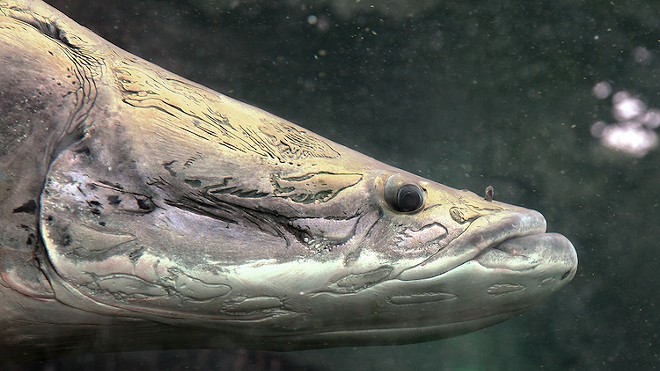Citizens of Florida, welcome your new 'river monster' overlords
By Colin Wolf on Tue, Feb 9, 2021 at 1:20 pm
Florida already has invasive Burmese pythons, Nile crocodiles, herpes monkeys and capybara, but now it can add to that terrible list one of the world’s largest predatory freshwater fish, which can grow up to 10 feet long and weigh over 400 pounds.
While on a hike last weekend along the Caloosahatchee River, Cape Coral resident Leah Getts spotted a dead arapaima, which are massive non-native fish typically found in South America’s Amazon Basin, reports Fort Myers news station WBBH.
“It was bigger than my 7-year-old. I thought, 'that is nothing I’ve ever seen before.' It was kind of white with a pinkish tail,” said Getts to the station. “It had a huge kind of open bass-looking kind of mouth. It didn’t look like anything I had heard of or seen before.”
After Getts posted a photo of the fish to Facebook, commenters pointed out that it was in fact an arapaima. “They were saying it was an arapaima, and I looked at pictures and it was dead-on,” added Getts.
John Cassani, an ecologist for the Calusa Waterkeeper, told the station the dead fish could indicate that there are more, which could be devastating to the local ecosystem. “Obviously a big aggressive predatory fish is popular amongst anglers. But the risk to the ecosystem far outweighs the recreational value of the species.”
According to the Smithsonian, arapaima are aggressive predatory fish that feed on pretty much whatever it can fit into its vacuum-like mouth, including fish, birds, lizards and mammals. Because of a modified swim bladder that opens into its mouth like a lung, arapaima are able to live in water with little to no oxygen, which also means they can survive on dry land for an entire day.
What’s worse, arapaima can also lay hundreds of thousands of eggs over their incredibly long life span of up to 20 years.
The fish has been a popular fixture of the Discovery Channel show River Monsters and is often referred to as a “dinosaur fish,” not because of its tough, armored scales, but due to the fact that the species hasn't changed much at all in the fossil record for over 23 million years.
This post first appeared on our sister website Creative Loafing Tampa.
–
Stay on top of Central Florida news and views with our weekly newsletters, and consider supporting this free publication. Our small but mighty team is working tirelessly to bring you Central Florida news, and every little bit helps.
While on a hike last weekend along the Caloosahatchee River, Cape Coral resident Leah Getts spotted a dead arapaima, which are massive non-native fish typically found in South America’s Amazon Basin, reports Fort Myers news station WBBH.
“It was bigger than my 7-year-old. I thought, 'that is nothing I’ve ever seen before.' It was kind of white with a pinkish tail,” said Getts to the station. “It had a huge kind of open bass-looking kind of mouth. It didn’t look like anything I had heard of or seen before.”
After Getts posted a photo of the fish to Facebook, commenters pointed out that it was in fact an arapaima. “They were saying it was an arapaima, and I looked at pictures and it was dead-on,” added Getts.
John Cassani, an ecologist for the Calusa Waterkeeper, told the station the dead fish could indicate that there are more, which could be devastating to the local ecosystem. “Obviously a big aggressive predatory fish is popular amongst anglers. But the risk to the ecosystem far outweighs the recreational value of the species.”
According to the Smithsonian, arapaima are aggressive predatory fish that feed on pretty much whatever it can fit into its vacuum-like mouth, including fish, birds, lizards and mammals. Because of a modified swim bladder that opens into its mouth like a lung, arapaima are able to live in water with little to no oxygen, which also means they can survive on dry land for an entire day.
What’s worse, arapaima can also lay hundreds of thousands of eggs over their incredibly long life span of up to 20 years.
The fish has been a popular fixture of the Discovery Channel show River Monsters and is often referred to as a “dinosaur fish,” not because of its tough, armored scales, but due to the fact that the species hasn't changed much at all in the fossil record for over 23 million years.
This post first appeared on our sister website Creative Loafing Tampa.
–
Stay on top of Central Florida news and views with our weekly newsletters, and consider supporting this free publication. Our small but mighty team is working tirelessly to bring you Central Florida news, and every little bit helps.

WE LOVE OUR READERS!
Since 1990, Orlando Weekly has served as the free, independent voice of Orlando, and we want to keep it that way.
Becoming an Orlando Weekly Supporter for as little as $5 a month allows us to continue offering readers access to our coverage of local news, food, nightlife, events, and culture with no paywalls.
About The Author
Scroll to read more Orlando Area News articles
Newsletters
Join Orlando Weekly Newsletters
Subscribe now to get the latest news delivered right to your inbox.




















